To celebrate International Women's Day, we wanted to give a shout out to some amazing women in the wine trade that we're delighted to work with from all over the world.

Here in our own backyard at Reserve, we count ourselves very lucky to be surrounded by successful women. Reserve's owner and founder Kate, has been working in the wine industry for over 20 years. She is joined by our Head of People Charlotte Bannon and Finance Manager Jenny Rutter, Marketing Manager Meghann Thorp and shop managers Tersina Shieh at Didsbury, Emily Casson at Mackie Mayor, Leila Jacklin at Picturedrome and many others throughout the wider teams.
However, despite being involved every aspect of the wine making process from the beginning, women have often been overlooked or relegated to the background. The wine industry of old has the reputation of an old boys club, and like many industries, has a gender disparity in positions of leadership. In 2019, a study by IBM surveyed 2,300 organisations across 9 countries and 10 industries. It found that women represented 43% of the workforce in the UK drinks industry in 2016, 25% were entry level professionals, 4% in senior management and 11% at Board level.
Thankfully, this is changing and you only have to look at networks such as the Women In Wine LDN who are, along with others, taking a leadership role and helping to shape the future of the industry. Looking through Harpers 30 under 30 - a definitive list of the UK industry’s up-and-coming talent you find that more than half of the the rising stars are women, across a variety of roles. There is a generation that sees a bright future for themselves within the wine industry.
We wanted to speak to some of the winemakers that we work with to find out about their views and experiences, and we were thrilled to receive some wonderful responses. Read on to get to know them a little better, and why not pick up a bottle of their fantastic wine too here!
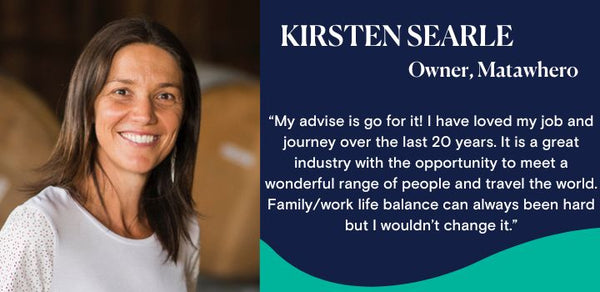
Kirsten Searle - Matawhero Wine (New Zealand)
Reserve Wines: How did your journey into the world of wine begin?
Kirsten Searle: I grew up with a dad that loved wines so it started from then. I arrived in NZ early 2000 to live (I am Australian born) and the wine industry was booming. I had experience in a more corporate career pre that but decided that I wanted to do something completely different and wine was it. I was fortunate to get a job working with Villa Maria and that's where my wine career started.
RW: Starting out, did you have any role models in the trade you looked to for inspiration or mentorship?
KS: Yes of course! When we purchased the winery in 2008, I had two children under two and another one on the way so we were fortunate to have some great help and guidance with very experienced people in the industry. Kim Crawford with winemaking and his wife Erica with marketing advice. We had grown grapes for their Kim Crawford brand prior to purchasing Matawhero.
RW: Have you encountered any specific challenges related to gender dynamics within the industry?
KS: People automatically think you are the “sales rep” if you are a women out conducting tasting and not the owner.
RW: Have you observed any changes over time regarding gender representation in leadership roles?
KS: There are definitely more women winemakers and also women running wine businesses but I think that this is happening across multiple industries worldwide and the wine industry is no different.
RW: Which wine will you be drinking to Celebrate International Women's Day?
KS: Chardonnay of course! Our main variety but it is my fav variety to enjoy but I also love the diversity of styles you can make.
RW: What advice would you give to aspiring women entering the wine trade?
KS: Go for it! I have loved my job and journey over the last 20 years. It is a great industry with the opportunity to meet a wonderful range of people and travel the world. Family/work life balance can always been hard but I wouldn’t change it.
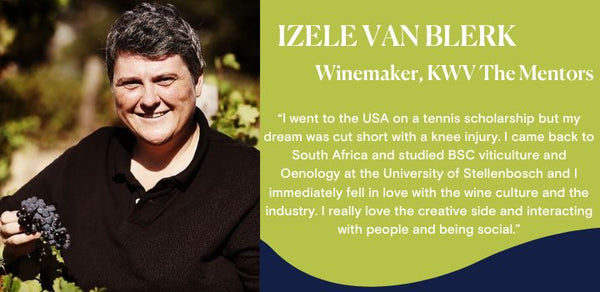
Izele van Blerk - KWV Wines (South Africa)
Reserve Wines: How did your journey into the world of wine begin?
Izele van Blerk: I was actually a tennis player, I went to the USA on a tennis scholarship. My dream was cut short with a knee injury and I decided to come back to South Africa. My father was a viticulturist and I grew up in a wine culture house. After my return to South Africa I started studying BSC viticulture and Oenology at the University of Stellenbosch, I immediately fell in love with the wine culture and the industry. After the first practical tasting at University, the rest was history. I came home the first weekend and said to my family, this might just suit my personality. I like wine, but what I like more is interacting with people and being social. Definitely the creative side…
RW: Starting out, did you have any role models in the trade you looked to for inspiration or mentorship?
IvB: Too many, but the one person that stood out was Richard Rowe. Richard was the Chief winemaker at KWV when I started my winemaking career, he invested time to the younger winemakers, teaching us not just everything about wine, but also the importance of wine marketing and sales. Understanding the consumer, understanding world wine styles and the importance of a winemaker representing the brand.
RW: Have you encountered any specific challenges related to gender dynamics within the industry?
IvB: I started at KWV in 2009 and we always had a healthy balance between male and female winemakers in the team. It is all about team dynamics and mutual respect for each other. I think we as a younger generation winemaker appreciate and need the old boys’ club of the wine industry, they have a lot of knowledge to share, but they also need the younger generation to challenge them on new wine styles and winemaking techniques in South Africa. You need to be fit for the job and the position should be given to the strongest candidate, not depending on the gender.
I have challenges everyday, but not because I am a woman, rather because of the nature of our job as winemaker. That is a big reason why I decided to become a winemaker and why I love what I am doing. Every single day presents a new challenge, it keeps you honest in what you do.
Change and challenges is always good especially if you want to produce world-class wines.
RW: Have you observed any changes over time regarding gender representation in leadership roles?
IvB: There is a good balance between male and female wine leaders in the industry, the winemakers Guild is led by Female leaders, WOSA is led by Female leaders just to name a few.
RW: What advice would you give to aspiring women entering the wine trade?
IvB: Action speaks louder than words, be honest and humble in your approach to winemaking. Listen and learn, the wine industry is a fun industry. Always remember that you are dependent on nature, you can only produce what nature gives you.
It is hard work, dedication and a team sport, every single link is important from vineyard to viticulture to winemaker to bottling, labelling, marketing and at the end sales. Make the consumer your friend, listen to them understand the needs. Last but not least TASTE, TASTE, TASTE.
RW: Which wine will you be drinking to Celebrate International Women's Day?
IvB: The Mentors Canvas 2020 – a blend of Shiraz, Petite Sirah, Carignan, Tempranillo and mourvedre. This multi-dimensional and complex red blend shows layered aromas of plum, raspberry and cherries. On the palate, the flavours of cassis and cinnamon combine with sweet tannins to deliver a concentrated and full-bodied wine.
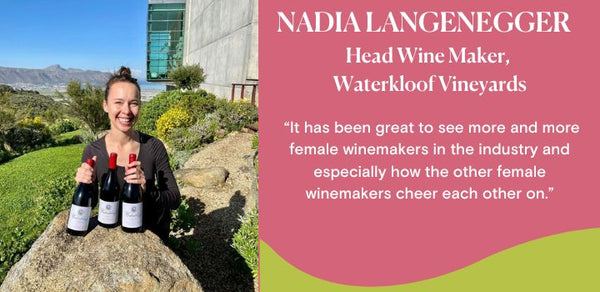
Nadia Langenegger - Waterkloof Vineyards
Reserve Wines: How did your journey into the world of wine begin?
Nadia Langenegger: I was fortunate enough to grow up in the beautiful winelands of the Cape. Lucky for us we had friends working at wine farms and my Father, as a hobby, had bee hives on a farm called Cordoba (now called Taaibosch), with that I often went with my Dad to check on the hives. We also managed to visit the winery on these outings and I found it fascinating seeing what they were doing in the cellar. With my Dad being a geologist and my Mom a botanist, venturing towards a science-related industry came natural to me and wine was the perfect choice that brings science and nature together.
RW: Starting out, did you have any role models in the trade you looked to for inspiration or mentorship?
NL: I had many role models and especially wine makers whom I looked at for inspiration and still do. My first harvest was at Flagstone winery working a long with Bruce Jack and Wilhelm Coetzee (now at Durbanville Hills wines). They taught me the core of the winemaking process. From there I was fortunate enough to work at wineries in Australia, New Zealand as well as in France. Everywhere stealing a little with my eyes and getting more inspired to find a style of wine that I liked. Another South African Winemaker who taught me to always be on the floor in the cellar was Andre van Rensburg who was the winemaker at Vergelegen winery for over 20 years - he was always in the winery and looking at each little detail. I respected that a lot.
RW: Have you encountered any specific challenges related to gender dynamics within the industry?
NL: Luckily I can say that I have not. The men in the industry have only been kind and respectful.
RW: Have you observed any changes over time regarding gender representation in leadership roles?
NL: It has been great to see more and more female winemakers in the industry and especially how the other female winemakers cheer each other on. We have some fantastic women in the industry and over the last decade there have definitely been more ladies.
RW: What advice would you give to aspiring women entering the wine trade?
See every encounter as a learning opportunity there are some great minds in the industry and people who want to share that knowledge. As a young person you must be receptive of that. Lastly travel and taste as much wine as you possibly can to educate your pallet. That is the only way of knowing what style of wine you would like to make.
RW: Which wine will you be drinking to Celebrate International Women's Day?
NL: I think I might lean towards a lovely aged German Riesling.
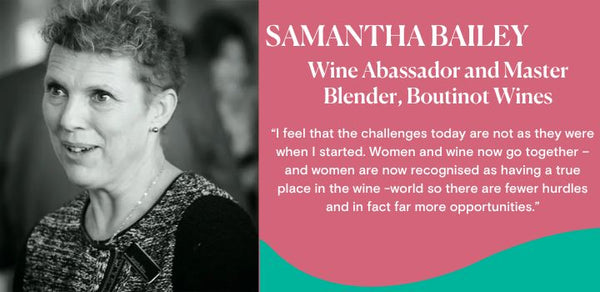
Samantha Bailey: To be honest, my quest to work with wine was born because I love the French language and decided during Uni that I wanted to live & work in France, so I had to fathom out how to make that possible! I’m from a very ‘normal’ English family – when I was young wine was for ‘high days and holidays’ so there was no written destiny that linked me to wine. I au-paired in France when I was 18 to improve my French before going to Uni. Then I spent my 3rd year in France and was posted in Beaune – I stayed with a family who had roots (and vines) in Beaujolais. I soon learnt that wine was central to so much in the area – culture, economics, politics - that I chose the subject for my dissertation and my interest grew from there. Wine was not my destiny, but it soon became my crusade! The university careers office advised me to go into accounting – what? Definitely not for me, so it was then up to me to forge my own path and work out a way to get back to France. To be honest, it was either wine or perfume because of the sensorial aspects – and the wine route was more realistic, although still a tough call at the time. A big struggle in fact, but where there’s a will there’s a way. Post grad interviews led me to The Wine Society where I secured my first job – as marketing analyst – interesting, but not directly linked with the actual liquid. An amazing team, access to tastings and WSET training and a move across into the Product Marketing Dept helped me on my way to truly discover wine and from then on I blossomed! Circumstance or hazard – I then had an opportunity to meet Paul Boutinot who was looking to set up an office in France to be on the ground for sourcing and production. Six weeks later, in January 1990, I was in Beaujolais tasting wines and setting up an office, 33 years on I’m still in Beaujolais and travelling the world sourcing wines for the Boutinot team. How amazing is that?!
RW: Starting out, did you have any role models in the trade you looked to for inspiration or mentorship?
SB: The most influential woman in my life has been my grandmother, who had a wonderful understanding of the difficulties of life and ways of coping that resonated with me. I spent a lot of time with her when I was younger – it made me realise just how much she was able to embrace change. She was born in 1898 so modernisation of society must have been a big shock but getting to grips with it and going along with it was just what she did – a trait I feel is incredibly important in today’s world.
RW: Have you encountered any specific challenges related gender dynamics within the industry?
SB: Attitudes to women in wine have changed enormously over the past 20 years. It’s great that women are now actively encouraged to pursue studies in wine but as I said, it was a very male-dominated environment when I first arrived in France, probably as it was a fairly manual role, but there’s no reason why women can’t work in a cellar – there’s no reason why women can’t handle grapes, drive tractors or manage hoses.
At the time people considered me quite ambitious – but I’m still here now, so it proves that if you have the will, anything is possible.
RW: What advice would you give to aspiring women entering the wine trade?
SB: I feel that the challenges today are not as they were when I started. Women and wine now go together – and women are now recognised as having a true place in the wine - world so there are fewer hurdles and in fact far more opportunities. The best way to succeed is to be determined, but also be flexible – the path to the final goal may not be straight, but one can learn so much by following the windy road, and meet so many people along the way. My wine journey has been an amazing life journey too.
RW: The wines you create now - which one has given you the most satisfaction?
Probably the greatest challenge and therefore the greatest satisfaction is the success of our Cuvée Jean Paul range. The French business was set up to take care of CJP, to be close to the source and create a range of good quality everyday drinking wines. Year in year out our aim is to provide quality and profile that customers feel safe with and can enjoy. We bottle our cuvées several times a year, but from day 1 to day 365 the aim is to offer consistency of quality – a tough call, but hugely satisfying as the response from customers is proof that we succeed.
RW: Which wine will you be drinking to Celebrate International Women's Day?
I have developed a weak spot for Champagne over the years so a nice glass fizz is a ‘go to’ for any celebration! I prefer the creamier style, so a wine with a little bottle age. I’m not a great Champagne connoisseur so I don’t look for one specific house. In France there are so many opportunities to source from small individual growers, it’s best to accept to broaden horizons.
I do have some pretty tasty alternatives on my doorstep too – Crémant de Bourgogne and Crémant de Jura offer some great wines at a more affordable level, and Crémant de Limoux is another one that I seek out – it’s great to have options!


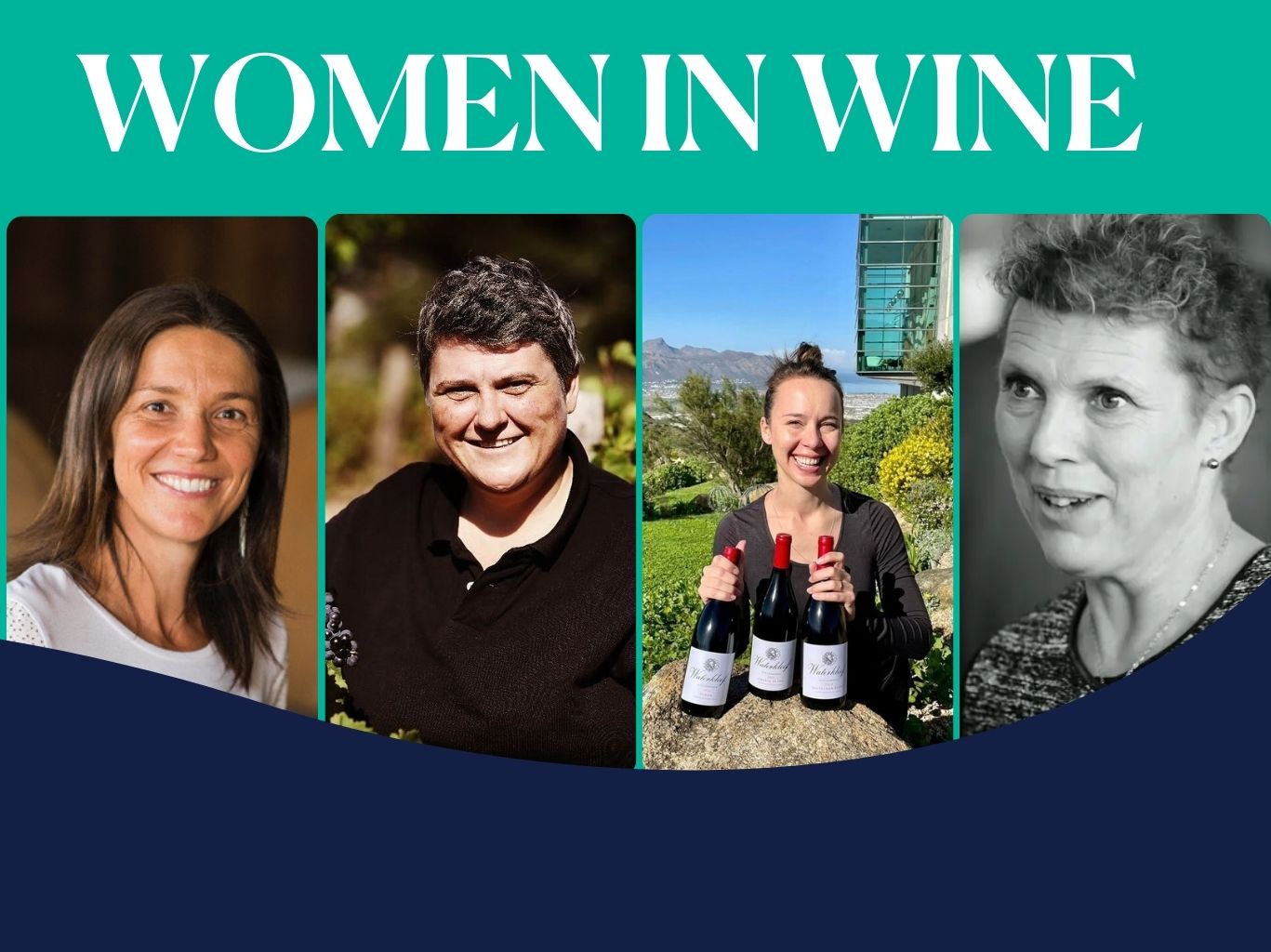
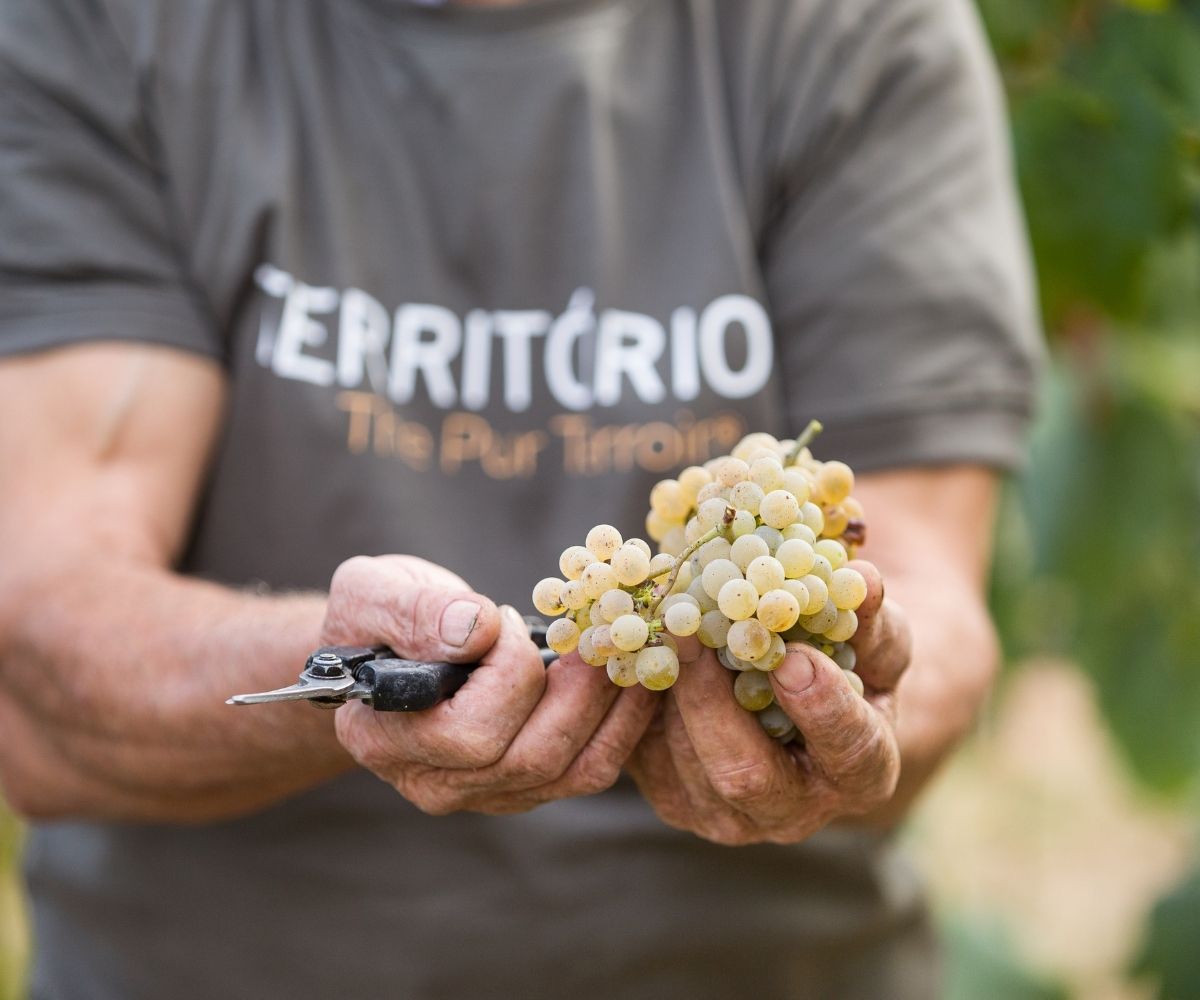
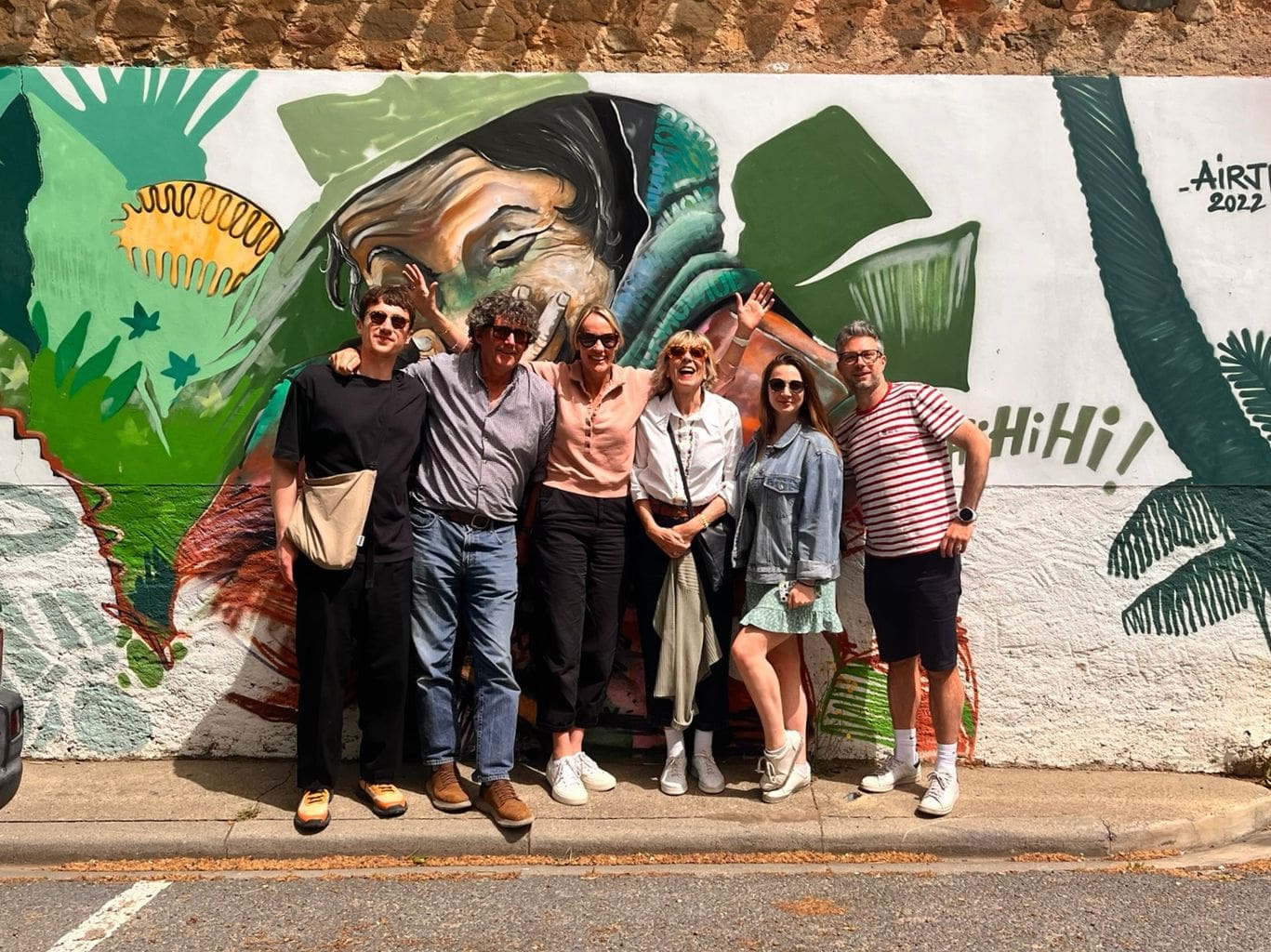
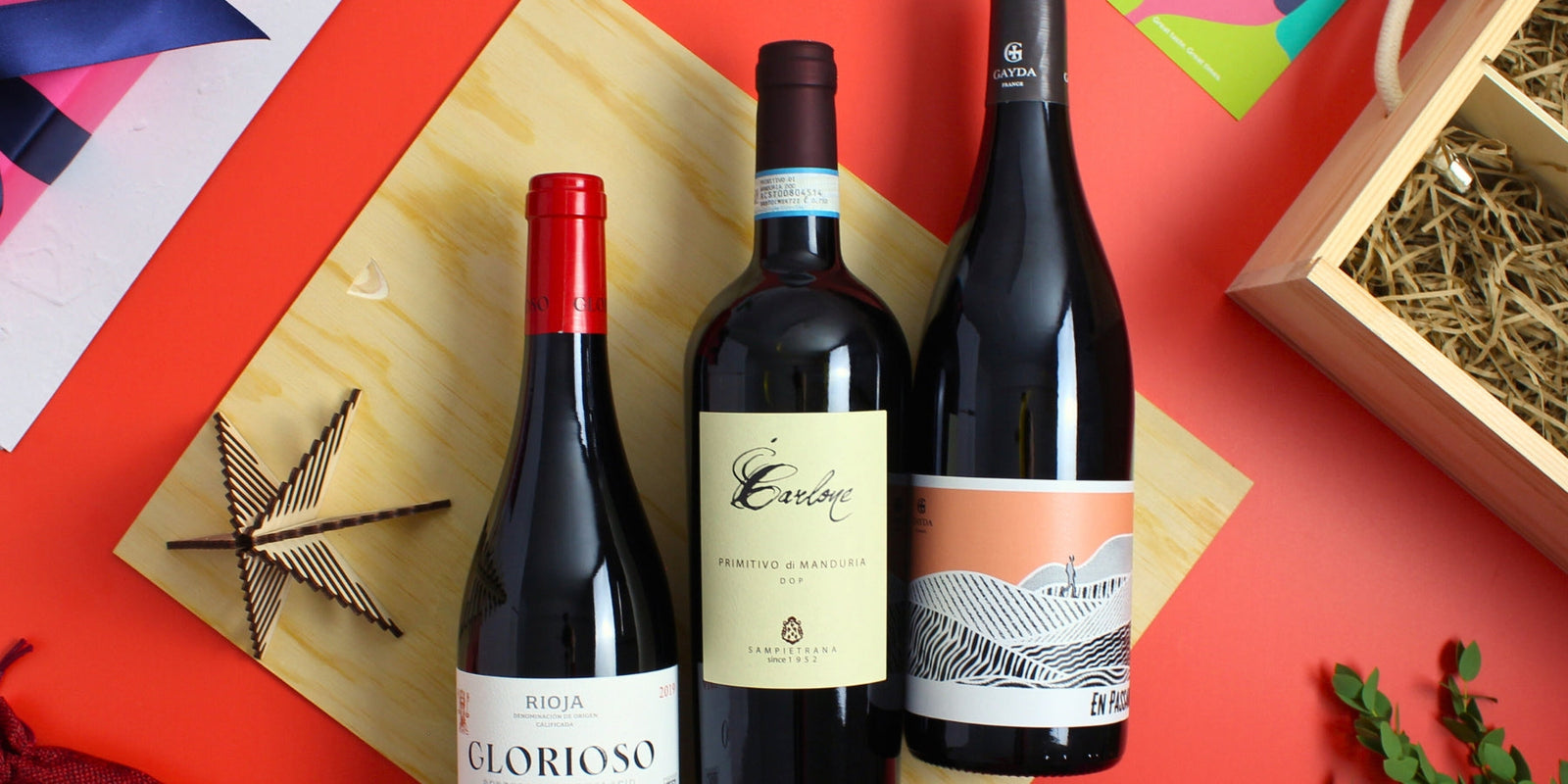
Leave a comment (all fields required)